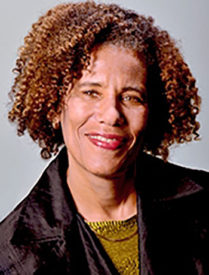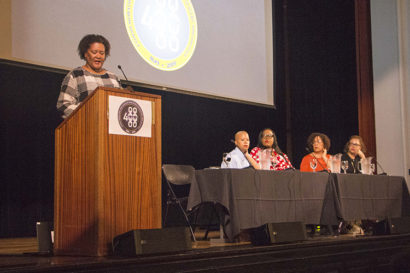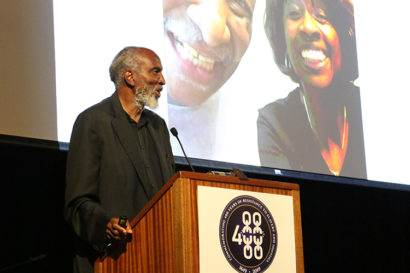Hundreds gather for symposium marking 400th anniversary of slave ship arrival
Campus marks the sordid anniversary with daylong conference
September 3, 2019

From left: Charlene Carruthers, an activist and organizer; Charles Henry, professor emeritus of African American Studies at Berkeley; and Waldo Martin, professor of American history and citizenship at Berkeley, spoke in the final panel, “Power and Resistance.” (UC Berkeley photo by Marcus Hanschen)
Last Friday, UC Berkeley initiated a yearlong initiative commemorating the 400th anniversary of the forced arrival of enslaved Africans in the English colonies with a daylong symposium. It drew hundreds of attendees who heard from more than a dozen historians and social scientists about the impact and legacy of slavery in society today.
Opening the symposium, Denise Herd, lead organizer of the “400 Years of Resistance to Slavery and Oppression” initiative, explained why it is crucial for Berkeley to acknowledge this sordid anniversary, invoking a famous quote by William Faulkner, who wrote that, “The past is never dead. It’s not even past.”

Denise Herd, professor of public health, is coordinating Berkeley’s yearlong initiative with the Haas Institute for a Fair and Inclusive Society. (School of Public Health photo)
“A major theme threaded through the symposium today is that the legacies of slavery and the post-Reconstruction period are very much alive and continue to influence today’s social, political and economic outlook on race and need to be confronted,” Herd told the audience, which was packed inside the International House auditorium.
Herd, who also is the associate director of the Haas Institute for a Fair and Inclusive Society and a professor of public health, later added, “We are taking one of the first steps on the longer journey to support efforts for justice, belonging and human rights.”
Friday’s speakers included scholars from Berkeley and other institutions across the United States and Canada who gave presentations during a series of panel discussions that examined slavery, memory, afterlife and resistance.
Chancellor Carol Christ also addressed the audience as the symposium’s start, summarizing the “long and troubling history” of African Americans’ experience — from slavery to Jim Crow to “separate but equal” and the “rampant discrimination that continues today.”

Read more stories about UC Berkeley’s observance of the 400th anniversary of the arrival of enslaved Africans to the English colonies.
“But this year’s commemorations also mark something else: They mark black Americans’ courage in the face of incredible adversity, they mark resilience, they mark triumph, they mark the vast range of black Americans’ contributions to society for the good of all people,” Christ said.
This initiative at UC Berkeley and similar ones across the country are being organized in the spirit of the “400 Years of African-American History Commission Act” that was signed into law last year. It created a commission to develop programs throughout the year to commemorate the anniversary.
Berkeley’s initiative is being organized by the Haas Institute, the African American studies and history departments, the African American Student Development Center and the Black Staff and Faculty Organization.

The first panel, “Slavery, Memory, Afterlife,” included speakers (from left): Leslie Harris, professor of history at Northwestern University; Christina Sharpe, a professor at York University; Stephanie Jones-Rogers, associate professor of history at Berkeley; and Gabrielle Foreman, professor of Africana Studies and History at the University of Delaware. It was moderated by Tina Sacks (right), an assistant professor at the School of Social Welfare. (UC Berkeley photo by Violet Carter)
The first panel at Friday’s symposium was moderated by Tina Sacks, an assistant professor at the School of Social Welfare, who addressed the theme of “Slavery, Memory, Afterlife.” The discussion included presentations from Leslie Harris, professor of history at Northwestern University; Christina Sharpe, a professor at York University; Stephanie Jones-Rogers, associate professor of history at Berkeley; and Gabrielle Foreman, professor of Africana Studies and History at the University of Delaware.
The second panel, on “Second Afterlife” and moderated by Nikki Jones, an associate professor in Berkeley’s Department of African American Studies, included panelists Dennis Childs, associate professor of African American literature; and Talitha LeFlouria, associate professor of African and African American Studies at the University of Virginia.
The final panel, “Power and Resistance,” included Waldo Martin, Berkeley professor of American history and citizenship; Charles Henry, professor emeritus of African American Studies at Berkeley; and Charlene Carruthers, an activist and organizer. It was moderated by Jovan Scott Lewis, an assistant professor of African American studies and geography at Berkeley.
In his keynote speech to close the symposium, john powell, director of the Haas Institute, discussed the link between slavery and white supremacy. Slavery, he said, created anti-black racism, which was necessary for the extraction of capital.

john powell, director of the Haas Institute, gave the keynote speech, about the link between slavery and white supremacy. (UC Berkeley photo by Marcus Hanschen)
“It was never about, ‘I don’t like you because you’re different. [Because] you have more melanin than me.’ It was about capital. It was about the U.S. industrializing … It was about the elites trying to figure out how to extract as much capital as possible and using people and peoples’ land to do that. Slavery is about America,” he said.
Looking to the future, powell called on the audience to go beyond working toward inclusion by taking a “deeper dive” into belonging. Belonging, he said, means co-creating a society that gives agency to all groups, not just those who belong to a certain identity.
“Blacks have to care about Native Americans. They have to care about poor whites. They have to care about transgender (people). Belonging transcends the narrow confines of one’s identity,” he said. “And it doesn’t mean tolerance. It means caring and loving. Learning to actually love each other.”